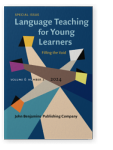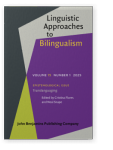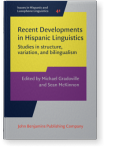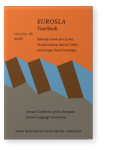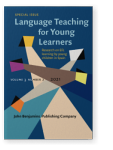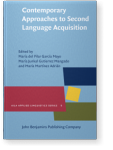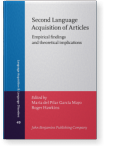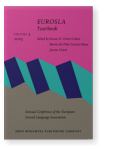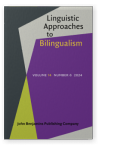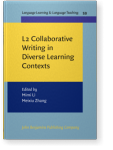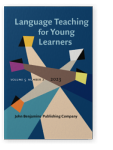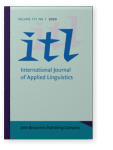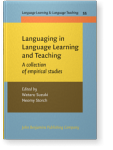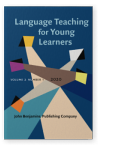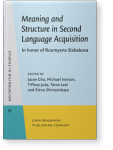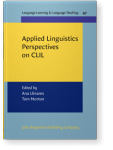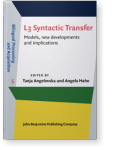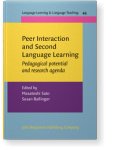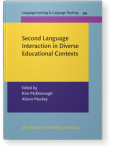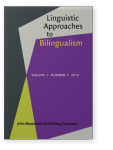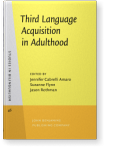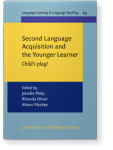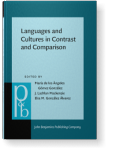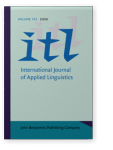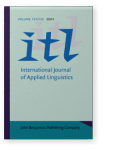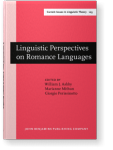María del Pilar García Mayo
List of John Benjamins publications for which María del Pilar García Mayo plays a role.
Journals
ISSN 1879-9264 | E-ISSN 1879-9272
Book series
Yearbook
Research on EFL learning by young children in Spain
Edited by María del Pilar García Mayo
Special issue of Language Teaching for Young Learners 3:2 (2021) vi, 190 pp.
Subjects Applied linguistics | Language acquisition | Language teaching | Multilingualism
Contemporary Approaches to Second Language Acquisition
Edited by María del Pilar García Mayo, María Juncal Gutiérrez Mangado and María Martínez-Adrián
[AILA Applied Linguistics Series, 9] 2013. xiii, 265 pp.
Subjects Applied linguistics | Language acquisition | Multilingualism | Theoretical linguistics
Second Language Acquisition of Articles: Empirical findings and theoretical implications
Edited by María del Pilar García Mayo and Roger Hawkins
[Language Acquisition and Language Disorders, 49] 2009. ix, 272 pp.
Subjects Generative linguistics | Language acquisition | Syntax | Theoretical linguistics
EUROSLA Yearbook: Volume 5 (2005)
Edited by Susan H. Foster-Cohen, María del Pilar García Mayo and Jasone Cenoz
[EUROSLA Yearbook, 5] 2005. iv, 281 pp.
Subjects Applied linguistics | Language acquisition | Language teaching | Multilingualism
2025 Researching the role of interaction in young learners’ acquisition of English: An interview with María del Pilar García Mayo Language Teaching for Young Learners: Online-First Articles | Interview
In this interview, Natsuko Shintani, the Review Editor of Language Teaching for Young Learners, invites Dr. María del Pilar García Mayo to share her expertise as a teacher and researcher. Dr. García Mayo is a Full Professor of English Language and Linguistics at the Universidad del País Vasco… read more
2024 Telicity judgments in L2 English by L1 Slovak speakers: The role of proficiency and exposure in telicity interpretations Linguistic Approaches to Bilingualism 14:6, pp. 775–808 | Article
The study investigates the acquisition of telicity in L2 English by L1 Slovak speakers as a function of L2 proficiency (measured by a cloze test score), exposure (operationalized as length of stay in an English-speaking country) and instruction type (monolingual vs. bilingual). Telicity… read more
2023 Chapter 4. Do task repetition and pretask focus on form instruction impact collaborative writing performance? Evidence from young learners L2 Collaborative Writing in Diverse Learning Contexts, Li, Mimi and Meixiu Zhang (eds.), pp. 80–108 | Chapter
This study examines the influence of task repetition (TR) and pretask focus on form instruction (FFI) on written collaborative production. Eighty-five low-proficiency EFL children carried out a dictogloss task twice: one targeting the 3rd person singular present “‑s”, and the other aiming at the… read more
2023 Does repeated pre-task planning have an impact on form-focused LREs? Evidence from EFL children Language Teaching for Young Learners 5:2, pp. 149–169 | Article
Pre-task planning has been shown to improve fluency and complexity in adult learners’ speech in monologic tasks. Previous work considered pre-task planning in interactive tasks with young children in an ESL setting and reported that, in general, it had an impact on the amount of talk. However,… read more
2021 Effects of proficiency and collaborative work on child EFL individual dictogloss writing Research on EFL learning by young children in Spain, García Mayo, María del Pilar (ed.), pp. 246–274 | Article
Collaborative writing has been traditionally studied in terms of language-related episodes (LREs), which have been shown to be influenced by learner proficiency. Yet, the impact of collaboration on the written product has received less attention, especially regarding child EFL learners. Our… read more
2021 Editorial: Research on EFL learning by young children in Spain Research on EFL learning by young children in Spain, García Mayo, María del Pilar (ed.), pp. 181–188 | Editorial
2020 The effect of task repetition on the patterns of interaction of ESL children ITL - International Journal of Applied Linguistics 171:1, pp. 90–112 | Article
Research on collaborative work has explored the benefits of task repetition (TR) for L2 development. TR has been claimed to improve L2 complexity, accuracy and fluency, provide opportunities for feedback, and increase learners’ engagement in their L2, as reported in studies that have explored… read more
2020 Chapter 1. Child EFL grammar learning through a collaborative writing task Languaging in Language Learning and Teaching: A collection of empirical studies, Suzuki, Wataru and Neomy Storch (eds.), pp. 19–40 | Chapter
The present study analyzed the effects of completing a dictogloss task on the development of English grammar (3rd person singular -s and articles) in a foreign language primary school context. Fifty 11–12 year-old elementary EFL Spanish learners worked on a dictogloss task individually, and in… read more
2020 Child EFL learners’ attitudes towards a collaborative writing task: An exploratory study Language Teaching for Young Learners 2:1, pp. 52–72 | Article
The way learners engage with tasks can crucially impact on learning opportunities and, therefore, more attention is now being devoted to task affect. This study examines the attitudes of an underresearched population, child EFL learners, towards a collaborative dictogloss task. Thirty-two… read more
2020 Collaborative writing and feedback: An exploratory study of the potential of modelsin primary EFL students’ writing performance Language Teaching for Young Learners 2:1, pp. 73–100 | Article
Research on collaborative writing and models as a form of written corrective feedback has been conducted with adult participants but research with children is scarce despite the growth of early EFL learning in school settings in the past twenty years. The aim of the present exploratory study was… read more
2018 Chapter 8. Proficiency and transfer effects in the acquisition of gender agreement by L2 and L3 English learners Meaning and Structure in Second Language Acquisition: In honor of Roumyana Slabakova, Cho, Jacee, Michael Iverson, Tiffany Judy, Tania Leal and Elena Shimanskaya (eds.), pp. 203–227 | Chapter
The present study examines proficiency and transfer effects in the acquisition of gender agreement in third person singular possessives (his/her) by second (L2) and third language (L3) learners of English. Within current generative second language acquisition research, gender agreement has been… read more
2017 CLIL and SLA: Insights from an interactionist perspective Applied Linguistics Perspectives on CLIL, Llinares, Ana and Tom Morton (eds.), pp. 33–50 | Article
The Interaction Hypothesis is one of the explanations for second language acquisition (SLA) (Hatch 1978; Long 1983). Numerous studies have shown that interaction facilitates SLA because learners have the opportunity to negotiate language input, receive feedback and modify their output (Long 1996;… read more
2017 Chapter 7. Transfer effects in the acquisition of double object constructions in English as an L3 L3 Syntactic Transfer: Models, new developments and implications, Angelovska, Tanja and Angela Hahn (eds.), pp. 143–171 | Chapter
The present study examines the role of transfer in the processing of double object constructions (DOC) in English as a third language (L3). A group of Basque/Spanish bilinguals and a group of Spanish speakers divided into three proficiency levels completed a self-paced reading task. Findings did… read more
2017 Chapter 3. Testing the current models of third language acquisition L3 Syntactic Transfer: Models, new developments and implications, Angelovska, Tanja and Angela Hahn (eds.), pp. 63–84 | Chapter
In this chapter, we argue that another factor should be brought into the general picture of third and additional language acquisition: the comprehensible linguistic input. Predictions of current models have been predominantly based on the cognitive-psychological prominence of the three languages… read more
2016 9. EFL task-based interaction: Does task modality impact on language-related episodes? Peer Interaction and Second Language Learning: Pedagogical potential and research agenda, Sato, Masatoshi and Susan Ballinger (eds.), pp. 241–266 | Article
Research on L2 interaction has shown that task modality (written vs. oral) influences language learning opportunities. However, most research has been carried out in ESL settings and few studies have investigated task modality differences in EFL contexts, where both quantity and quality of exposure… read more
2013 2. Language-related episodes during collaborative tasks: A comparison of CLIL and EFL learners Second Language Interaction in Diverse Educational Contexts, McDonough, Kim and Alison Mackey (eds.), pp. 25–44 | Chapter
Recent research in different educational settings has provided support for the use of collaborative tasks in which learners consciously reflect on their own language (i.e., produce language-related episodes or LREs). However, little is known about whether learners in… read more
2013 Introduction Contemporary Approaches to Second Language Acquisition, García Mayo, María del Pilar, María Juncal Gutiérrez Mangado and María Martínez-Adrián (eds.), pp. 1–4 | Article
2013
This study investigates knowledge of the nominal agreement domain in L3 English by Basque/Spanish bilinguals. Gender agreement has been claimed to be an interpretable feature in English and could be claimed to be so for Basque, whereas Spanish shows uninterpretable gender agreement. Under current… read more
2013 Chapter 8. Investigating L2 spoken syntax: A Usage-based perspective Contemporary Approaches to Second Language Acquisition, García Mayo, María del Pilar, María Juncal Gutiérrez Mangado and María Martínez-Adrián (eds.), pp. 153–176 | Chapter
This chapter explores the implications and applications of research into native spoken language in the context of second language learning and use. Spoken language structures differ in fundamental ways from those of written language and require to be analysed on their own terms. The chapter… read more
2012 L3 morphosyntax in the generative tradition: The initial stages and beyond Third Language Acquisition in Adulthood, Cabrelli, Jennifer, Suzanne Flynn and Jason Rothman (eds.), pp. 9–32 | Article
2009 Article choice in L2 English by Spanish speakers: Evidence for full transfer Second Language Acquisition of Articles: Empirical findings and theoretical implications, García Mayo, María del Pilar and Roger Hawkins (eds.), pp. 13–35 | Article
2009 Introduction: The interest of article acquisition for theories of SLA Second Language Acquisition of Articles: Empirical findings and theoretical implications, García Mayo, María del Pilar and Roger Hawkins (eds.), pp. 1–10 | Article
2008 Incidental focus on form and learning outcomes with young foreign language classroom learners Second Language Acquisition and the Younger Learner: Child's play?, Philp, Jenefer, Rhonda Oliver and Alison Mackey (eds.), pp. 173–192 | Article
This chapter addresses the issue of how unplanned focus on formis accomplished in an English as a foreign language (EFL) classroom and its effect on adolescents’ learning outcomes. The findings support previous research indicating that adolescents benefit from interaction in foreign language… read more
2008 Awareness of orthographic form and morphophonemic learning in EFL Languages and Cultures in Contrast and Comparison, Gómez González, María de los Ángeles, J. Lachlan Mackenzie and Elsa M. González Álvarez (eds.), pp. 299–326 | Article
There is a growing body of evidence that form-focused instruction (FFI) promotes second language learning, specifically when it raises learners’ awareness of linguistic form (Ellis 2001). However, very few studies of phonological acquisition have been performed to date within a FFI framework. This… read more
2006 Agreement in the English Interlanguage of Basque/Spanish Bilinguals: a Minimalist Farewell to pro ITL - International Journal of Applied Linguistics 151, pp. 83–98 | Article
This study investigates the status of subject pronouns in the English interlanguage of Basque-Spanish bilinguals from a minimalist perspective. The oral production of 20 participants was analyzed at two different points in their acquisition of English (Time 1:396 hours of exposure; Time 2:564 hours… read more
1993 A new look at Parasitis Gaps Linguistic Perspectives on Romance Languages: Selected Papers from the XXI Linguistic Symposium on Romance Languages, Santa Barbara, February 21–24, 1991, Ashby, William J., Marianne Mithun and Giorgio Perissinotto (eds.), pp. 249–258 | Article
